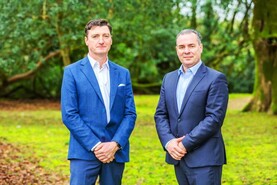With Lakeland Dairies, Aurivo and Arrabawn reporting annual results this week, we are starting to get a clear picture of how the industry performed last year, how 2024 has started and what processors are looking for in the future.
Adding in Dairygold from last week, we can see that from processing almost 4.5bn litres of milk, the four co-ops made a combined €7m in after-tax profit.
To put it another way, for every 650 litres of milk processed, there was only €1 of profit made last year.
We see some differences in the final figures from the three in the news this week.
Lakeland made a small loss due to some once-off costs, Arrabawn made extra money from selling its milk delivery business and Aurivo made a little less as it bought that business.
But there are definitely a few themes which are common across the board. Nobody is talking about investing in capacity. Lakeland says it has “right-sized” its business, Aurivo feels “well invested” and Arrabawn is comfortable at 500m litres.
There is even a bit of buyer’s remorse kicking in. One CEO said that if the industry knew then what it knows now, it would not have invested so much money in so much capacity since the end of quotas.
Another thing that is clear is that nobody really knows where the price of milk is going.
Perhaps battle-scared after the last two extremely volatile years, no CEO the Irish Farmers Journal spoke to would even give a ballpark figure on where the milk price might go during the year.
Everyone said that they are comfortable with their own milk supply staying at around the level seen in 2023. This is despite the poor start to the 2024 season, which has seen supplies drop and, more importantly, protein and milk solids fall well back due to the weather.
Finally, the derogation situation is front and centre as the major risk in the coming years. The uncertainty already in place is hurting sentiment, and everyone agrees that there must be no further cuts to it, and that reassurance on that needs to come as soon as possible.
With Lakeland Dairies, Aurivo and Arrabawn reporting annual results this week, we are starting to get a clear picture of how the industry performed last year, how 2024 has started and what processors are looking for in the future.
Adding in Dairygold from last week, we can see that from processing almost 4.5bn litres of milk, the four co-ops made a combined €7m in after-tax profit.
To put it another way, for every 650 litres of milk processed, there was only €1 of profit made last year.
We see some differences in the final figures from the three in the news this week.
Lakeland made a small loss due to some once-off costs, Arrabawn made extra money from selling its milk delivery business and Aurivo made a little less as it bought that business.
But there are definitely a few themes which are common across the board. Nobody is talking about investing in capacity. Lakeland says it has “right-sized” its business, Aurivo feels “well invested” and Arrabawn is comfortable at 500m litres.
There is even a bit of buyer’s remorse kicking in. One CEO said that if the industry knew then what it knows now, it would not have invested so much money in so much capacity since the end of quotas.
Another thing that is clear is that nobody really knows where the price of milk is going.
Perhaps battle-scared after the last two extremely volatile years, no CEO the Irish Farmers Journal spoke to would even give a ballpark figure on where the milk price might go during the year.
Everyone said that they are comfortable with their own milk supply staying at around the level seen in 2023. This is despite the poor start to the 2024 season, which has seen supplies drop and, more importantly, protein and milk solids fall well back due to the weather.
Finally, the derogation situation is front and centre as the major risk in the coming years. The uncertainty already in place is hurting sentiment, and everyone agrees that there must be no further cuts to it, and that reassurance on that needs to come as soon as possible.






 This is a subscriber-only article
This is a subscriber-only article










SHARING OPTIONS: